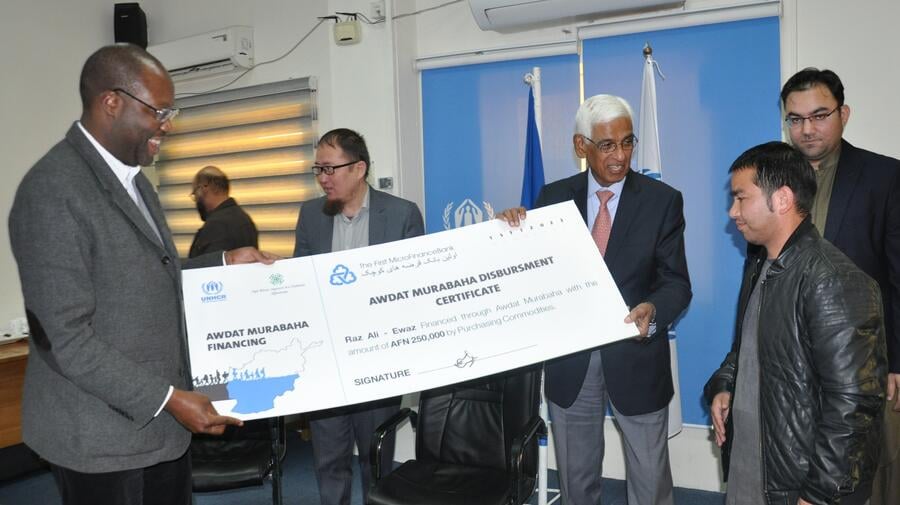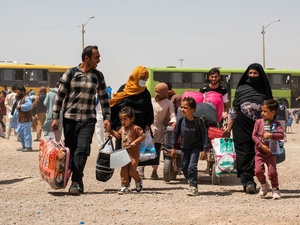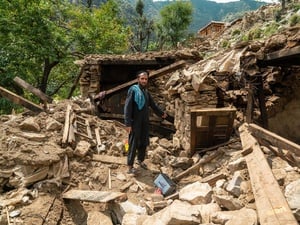UNHCR with First MicroFinanceBank-Afghanistan launch microfinance scheme
UNHCR with First MicroFinanceBank-Afghanistan launch microfinance scheme

Aga Khan Development Network Special Envoy His Excellency Akbar Ali Pesnani holding check with UNHCR Representative Leonard Zulu for presentation to initial beneficiaries of grants and microfinancing (GRAM) scheme during Kabul ceremony, 15 Nov 2022
UNHCR, the UN Refugee Agency, with the Aga Khan Development Network’s First MicroFinanceBank-Afghanistan (FMFB-A), have launched a new microfinancing scheme to assist internally displaced people, returnees, and residents of host communities engaged in small business activities.
The Grants and Microfinance (GRAM) scheme, which is Islamic and Sharia financing compliant, is a UNHCR + FMFB-A joint initiative to help small businesses, particularly women-run enterprises. The scheme is based around the Awdat Murabaha model to support financial inclusion and help shift returnees from humanitarian assistance and into productive economic activities.
This is UNHCR’s first microfinance initiative in Afghanistan aiming to benefit the most vulnerable people as they move into productive economic activities. The scheme is initially being rolled out by First MicroFinanceBank in five provinces, Balkh, Bamiyan, Herat, Kabul, and Nangarhar and will expand to other locations where FMFB-A maintains branches.
Extreme hardship faced by many people in Afghanistan raises widespread protection concerns as households adopt harmful coping mechanisms like leaving school, child labour, and early marriage. Under the UNHCR + FMFB-A scheme, Afghan returnees and IDPs aged from 18 to 60 who possess a valid identity card and have prepared a rational business plan can apply for the Awdat Murabaha financing.
The first beneficiaries of the new GRAM programme, three women and two men, received their loans on 15thNovember. Under the scheme, loans range between Afghanis 25,000 (US $280) to a maximum of Afghanis 300,000 (US $3,370), with repayments set at equal monthly installments.
The first loan recipients are engaged in projects like operating a small shop or running a tailoring workshop. UNHCR expects the boosted income facilitated by the loans will help support more than 3,500 immediate family members through 2022. Through the end of 2022, the new scheme aims to provide some 34 million Afghanis (US $386,891) to 500 recipients.
“Afghans, particularly women, are striving to support their households with very marketable skills and abilities,” declared UNHCR Representative Leonard Zulu. “This initiative will help individuals get a firm foothold on the business ladder and establish themselves, while delivering more economic vitality to their communities.”
The GRAM initiative is part of UNHCR’s area-based work in 80 Priority Areas of Return and Reintegration (PARRs) to enhance access to essential services and enhance self-reliance to mitigate further displacement and build community resilience.
Recent assessments in many of UNHCR’s 80 Priority Areas of Return and Reintegration, which include Kabul, Herat, Jalalabad, Kandahar and Mazar-i-Sharif and 75 districts located throughout Afghanistan, indicated that a lack of access to viable economic opportunities and formal financial services is a key obstacle to self-reliance for returning IDPs and former refugees, as well as host community residents.
“Financial exclusion in Afghanistan is amongst the highest in the world,” said Ziauddin Haidari, FMFB-A Chief Executive Officer. “As part of our business mandate, we believe that financing small entrepreneurs improves access to finance and financial inclusion and will help project beneficiaries to become financially sustainable.”
GRAM complements UNDP’s Area-Based Approach to Development Emergency Initiative (ABADEI) programme, FAO’s community resilience scheme supporting farmers, and the joint FAO-UNHCR-UNWomen “Women’s Access, Dignity and Advancement (AWADA) initiative.
UNHCR’s 80 designated PARR areas comprise its main operational response zones in Afghanistan, in line with the Solutions Strategy for Afghan Refugees (SSAR) and the multisectoral Humanitarian-Development-Peace (HDP) interventions.
For more information on this topic, please contact:
- UNHCR Afghanistan, Peter Kessler, +93 70 2465 614









